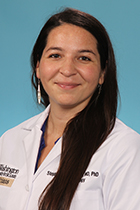Principal Investigators

Julie Schwarz, MD, PhD is the Director of the Cancer Biology Division and an R01 funded investigator. Her laboratory research includes large scale studies using human tumor specimens to study the biologic pathways that regulate treatment response in cervical cancer. These studies have employed gene expression, micro-RNA expression and genomic analyses. She has identified alterations in expression of genes from the PI3K/Akt pathway that are associated with treatment response in cervical cancer. Most recently, she has identified genomic mutations in PIK3CA and PTEN that are associated with treatment response and glucose uptake. She is currently studying how these alterations influence cervical cancer glucose metabolism and how metabolic differences may influence the response to radiation and chemotherapy.
Dr. Schwarz performs clinical research that focuses on the use of post-therapy FDG-PET imaging as an indicator of response to chemo-radiation therapy. The majority of these studies focused on cervical cancer, which has no reliable molecular biomarker for the evaluation of treatment response. These studies were instrumental in establishing the 3 month post-therapy FDG-PET scan as a reliable tool for monitoring treatment response and integrating this strategy into routine practice for cervical cancer patients.
Contact

Buck Rogers, PhD is a NIH funded Professor of Radiation Oncology and the Associate Director of the Cancer Biology Division. Dr. Rogers has more than 20 years of experience in radiochemistry, gene therapy, and novel radiation therapeutics. He has extensive experience in the development of radiolabeled antibodies and peptides for targeted imaging and therapy of cancer. In particular, he investigated copper-64 which is used for positron-emission tomography (PET) imaging and potentially for therapy. These studies were very important in the development of new chelators that have allowed the use of Cu-64 in clinical trials. Dr. Rogers tags proteins and peptides with radioactivity in combination with a gene transfer method to develop a novel imaging/therapy paradigm with a team of collaborators. This approach uses an adenoviral gene therapy vector that encodes a gene for a cell surface receptor. This receptor can then be targeted with radioactive substrates for imaging or therapy applications. These studies have had major implications in the field of gene therapy in that these gene transfer vectors can now be imaged to determine the location and extent of gene transfer as well as potential synergistic therapy with the appropriate radionuclides. Lastly, Dr. Rogers has led research that targets the gastrin-releasing peptide receptor (GRPR), which is a G-protein coupled receptor and been shown to be upregulated in a variety of cancers. Bombesin is a fourteen amino acid peptide that binds with high affinity to GRPR. He has tagged bombesin or bombesin analogues with radionuclides for PET imaging of GRPR-expressing tumors in preclinical models. He has evaluated several analogues and several radionuclides. These studies have led to dramatic improvement in peptide radiopharmaceuticals and their evaluation in clinical studies.
Contact

Dennis Hallahan, MD has 20+ years of uninterrupted NCI/NIH funding. The Hallahan laboratory has discovered several molecular targets for drug development in cancer. Discovery strategies have included Proteomics and lipidomics. These discoveries have gone on to preclinical and clinical drug development of a number of novel cancer drugs. Most notable are inhibitors of PLA2 and the LPA receptor. More recently, the Hallahan laboratory has identified TIP1 and GRP78 as molecular targets to enhance the efficacy of radiation therapy. Dr. Hallahan’s lab has developed monoclonal antibodies and scFv antibodies to radiation inducible neoantigens that are specific to cancer. These antibodies activate immune effector cells. They have also been conjugated to therapeutic agents such as radiopharmaceuticals. More importantly, antibodies to radiation inducible TIP1 and GRP78 show efficacy in vitro and in mouse models of human cancer. The Hallahan laboratory has developed several drug delivery systems using nanoparticles and liposomes. These particles have been conjugated to peptide ligands that bind to radiation inducible receptors in cancer. This approach has increased the bioavailability of doxorubicin and paclitaxel specifically to cancer. Pre-clinical efficacy and proof of concept studies have been completed. Current research combines our lead cancer specific ligand conjugated to PEG in liposomal formulation.
Drugs that have entered clinical trials include a radiation inducible therapeutic gene that advanced through Phase 3 clinical trials. Radiation guided drug delivery using peptidomimetic completed feasibility studies. A molecular targeted radiation protector is presently in a phase 2 clinical trial.
Contact

Dr. Bergom is an R01-funded investigator focused on utilizing unique pre-clinical genetic models to improve the effectiveness of radiation therapy and decrease side effects from radiation exposure of normal tissues. Her research specifically focuses on using genetic models to identify factors in the tumor microenvironment that enhance the effectiveness of radiation therapy, as well as using these models to identify genetic variants that alter the sensitivity of the heart to radiation exposure. Her group has conducted the first genetic mapping studies to identify genetic modifiers of radiation-induced cardiac toxicity (Schlaak et al., Am J Physiol Heart Circ Physiol, 2019). These studies demonstrated that heritable genetic factors on rat chromosome 3 can greatly modify sensitivity of the heart to radiation-induced cardiac dysfunction. Additional studies have examined the roles of innate and adaptive immunity and mitochondrial dysfunction in these responses, as well as further genetically mapped the area of chromosome 3 responsible for altering sensitivity to cardiac radiation exposure. Similar genetic studies have also demonstrated that variants in rat chromosome 3 alter radiation sensitivity of breast tumors due to changes in the tumor microenvironment. Dr. Bergom’s laboratory employs a number of techniques for these studies, including genetic mapping, Next Generation Sequencing including species-specific RNA-Sequencing, and advanced pre-clinical models of tumor and normal tissue radiation exposure. These studies are providing potential biomarkers and therapeutic targets that may enhance tumor responses to radiation therapy and minimize radiation-induced cardiac function.
Contact

David Curiel, MD, PhD develops gene transfer vectors to advance the human application of gene therapy. To overcome the limited capacity of available viral vectors to deliver large genes, Dr. Curiel conceptualized an approach whereby heterologous DNA was carried on the exterior of the virus rather than configured within the parental virus genome. This design is a conceptual departure from all historical vector paradigms. This new system embodies elements of viral vectors and non-viral vector configured into a single particle. This design takes advantage of both classes of vector agents in a wide range of applied contexts, including a human clinical trial of cancer vaccination in Europe. This vector design was featured in a news item in the journal Science. In addition, this concept of derived “mosacic” vectors, now represents a legitimate sub-field within gene therapy. In addition, the “mosacic” design paradigms resulted in the Development of an Ad-AAV Chimera: Piggy Backing Vectors Through Camelids.
Dr. Curiel identified a deficiency at the primary adenoviral receptor “CAR” in human primary tumor not noted in immortalized human cell lines. The new universal recognition of “CAR deficiency” characterizing human epithelial carcinomas clearly constituted the basis of tumor cell resistance to Ad-mediated transduction, and thus failure of cancer gene therapy interventions. In addition, the spurious predictive value of immortalized human cell lines at (and their murine xenograft model derivations), suggested the need for more stringent models. Finally, the recognition of tumor cell CAR levels limiting Ad gene transfer efficacy suggested the need for Ads which embodied “CAR independent” gene transfer capacity. To this end, he endeavored a series of gene capsid modifications to alter Ad tropism to achieve CAR-independent infection of tumor cells. A number of modifications were defined that achieved this biologic goal with dramatic enhancements in Ad infectivity. These adenoviral vectors have now been applied in human clinical trials for cancer. He modified an adenovirus virotherapy agent that dramatically augmented its oncolytic potency. On this basis, the FDA has approved his application for Fast Track status for malignant gliomas.
Contact
For more information about research opportunities in Dr. Curiel’s laboratory, please contact Karen Burns (burnsk@wustl.edu).

Carl DeSelm, MD, PhD, joined the Washington University faculty in June 2018 as an assistant professor of Radiation Oncology with a laboratory in the Bursky Center for Human Immunotherapy and Immunology Programs (CHiiPs). His research is based upon several fundamental ideas that have surfaced in recent decades. The first is that within each patient are immune cells dedicated to finding and destroying microscopic organisms that are far more sophisticated than any drug developed by man. The second is that these immune cells, generally T cells, can be modified to find and destroy tumor cells, using a chimeric antigen receptor (CAR). Using this approach, large, advanced, or aggressive cancers can sometimes be completely eliminated after a single treatment with the patient’s own modified immune cells. A major question remains – how do we achieve this result for all cancers, and all patients.
One major obstacle to applying this technique to all cancers is the difficulty in finding target molecules that are only expressed on the tumor cells, and not on critical normal tissues. Further, if not every tumor cell expresses the target molecule, the cancer will not be cured, as the negative cells that escape will eventually grow back. One major focus of the lab is identifying novel ways by which CAR cellular therapy can overcome the problem of antigen escape, to fully eliminate disseminated, heterogeneous cancer cells.
Additional problems exist in solid tumors, including poor penetration of the tumor by CAR T cells, and inherent resistance of particular tumors to T cell killing. The mechanisms by which these occur, and methods to overcome them, are active areas of investigation within the laboratory.
Radiation therapy is known to modulate the immune response in a variety of ways, but its effect on cellular therapy is poorly understood. An additional major focus in the laboratory is to examine the effect of radiation therapy on the systemic and local tumor response to CAR T cell therapy, and develop CARs that function synergistically with radiation and other highly effective treatment modalities.
Contact

Dr. Vaishali Kapoor joined the faculty at Washington University in 2019 after completing her postdoctoral research in Dr. Dennis Hallahan’s lab at the Department of Radiation Oncology at Washington University. Dr. Kapoor earned her Ph.D from the All India Institute of Medical Sciences, New Delhi. Her research involves development of novel drug candidates against radiation-inducible neo-antigens. Radiation treatment induces cell-surface expression of novel intracellular proteins. These surface expressed proteins can then be targeted using peptides and monoclonal antibodies for cancer imaging and therapy. Dr. Kapoor’s aim is to identify and characterize the lead peptide and antibody which can be used for pre-clinical efficacy studies and then be extended to the clinic.
Contact

Stephanie Markovina, MD, PhD studies novel metrics to serve dual purpose as biomarkers for prognosis and response to radiation therapy, as well as therapeutic targets for human solid tumors such as cervical and anal cancers. She studies the role of Squamous Cell Carcinoma Antigen (SCCA), a member of the SERPIN superfamily, and its role in tumor cell resistance to radiation and chemotherapy. Her lab is investigating the role of the lysosome in tumorigenesis and response to anti-cancer therapies. Research goals ultimately are to better stratify of patients prior to initiation of treatment, or early into treatment will allow individualized precision therapy for patients and ultimately better outcomes. Dr. Markovina hopes to understand the molecular role of these biomarkers in cancer pathogenesis and tumor resistance to anticancer treatments such as radiation and chemotherapy, and that this better understanding will lead to identification of novel therapeutic targets.
Contact

Jin Zhang, PhD, focuses on creating and integrating advanced computational approaches using high-throughput sequencing data and imaging data into the development of novel diagnostic, prognostic, and therapeutic strategies in cancer. The lab has developed a series of gene fusion discovery and gene fusion function predicting tools, and discovered novel gene fusion biomarkers in endocrine therapy resistant breast carcinoma, mixed fibrolamellar hepatocellular carcinoma, and relapsed adult B lymphoblastic leukemia. Besides gene fusions, they have also characterized the landscape of small RNAs (17-200nt) and long non-coding RNAs (>200nt) using novel deep sequencing technologies in acute myeloid leukemia and prostate adenocarcinoma. The Zhang Lab is currently collaborating with Radiation Oncologists, Physicists, and Molecular Biologists to elucidate the cancer biology and discover novel biomarkers of cervical squamous cell carcinoma and endocervical adenocarcinoma, through studying the interaction of human papillomavirus (HPV) and cervical cancer gene expression, the alteration of small RNA expression in cervical cancer, and the alterations of pathways that influence cervical cancer glucose metabolism and the response to radiation and chemotherapy.
Dr. Zhang’s lab has also been developing novel informatics approaches to address the critical need for analyzing the rapidly expanding quantities of biological and medical data to impact patient care, including advanced algorithms in split read alignment, pan-cancer analysis using cloud computing, and machine learning techniques. His article of the state-of-the-art gene fusion discovery tool (INTEGRATE) he developed was featured in the 2017 International Medical Informatics Association Yearbook, as one of the four best articles in the ‘Bioinformatics and Translational Informatics’ subfield of medical informatics literature published in the year 2016.
Contact
For more information about research opportunities in this laboratory, please contact Dr. Jin Zhang (jin.zhang@wustl.edu).